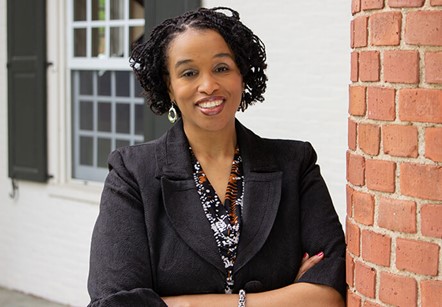Yale Divinity School is the site of a new project aimed at accelerating innovation in young adult ministry and connecting congregations with emerging adults who are spiritual but unchurched.
The Young Adult Ministry Innovation Hub at YDS is the work of Professor Almeda Wright, who will oversee a $1.5 million grant from Lilly Endowment Inc. Over the five years of the grant, 20 young adult coaches and leadership teams from 20 congregations will work together to study the relationship between churches and young adults and to design, implement, and assess new ways of doing ministry.
 The grant, approved to Yale University, is part of Lilly Endowment’s Young Adult Initiative. The goal of the nationwide initiative is to support efforts to deepen the religious lives of young adults (ages 23 to 29) and to engage them more fully in the life of Christian congregations.
The grant, approved to Yale University, is part of Lilly Endowment’s Young Adult Initiative. The goal of the nationwide initiative is to support efforts to deepen the religious lives of young adults (ages 23 to 29) and to engage them more fully in the life of Christian congregations.
“Our hope is that young adults and congregations can learn together how to build better communities around shared experiences of worship and working towards justice, with attention to the complexities and diversity in our lives together,” says Wright, Associate Professor of Religious Education and an expert on the spiritual life of young Black people.
The project will focus on congregations in the Northeast (especially the greater New Haven area). While open to ministry innovators of all backgrounds, the innovation hub will prioritize Black and Brown congregations and the leadership of BIPOC (Black, Indigenous, People of Color) young adults.
The project team will start this fall, inviting congregations to become part of the first 10-church cohort beginning work in the fall of 2023 and continuing for two years. A second 10-congregation cohort will follow, also for two years.
To highlight the project’s potential, Wright tells the story of a young African American man who experienced a spiritual crisis after returning home from protesting the police killing of Michael Brown in Ferguson, Missouri. “He didn’t know if there was a church where he and other young adults could go and just be—whether angry, outraged, or sad—as they attempted to reconnect with the Divine, themselves, and their communities and to process the ongoing realities of violence and injustices in the United States,” Wright says.
Instead of being stymied by the lack of a church home where he could process his experience, this young man and a few like-minded people created a space themselves, partnering with a church to create a series of worship services that gave voice to their experiences and their spiritual dimensions.
Wright says the innovation hub at Yale will address a key problem that separates congregations and young people: the failure by many churches to see the religious and spiritual dimensions of young adults’ work to create beauty and community while challenging social injustices.
“Many young people are thinking about ways of cultivating relationships with God, the Spirit, and each other that may or may not be as institutionally tethered as these kinds of undertakings have been in the past,” Wright says. “Religion is still important to them—their spirituality and deep relationships are still important to them—but where and how they pursue them doesn’t necessarily look like what churches grew accustomed to seeing in the past.”
In addition to the 20 young adult coaches, the project aims to engage at least 100 emerging adults in a process of “positive transformation as a result of their improved relationships with or in congregations,” according to the grant proposal. Members of this broader group will pursue projects in coordination with the coaches and congregation leaders.
Wright and her team will research, develop, and implement at least four models for listening to the hopes and wisdom of young adults and for empowering them to cultivate connections between their lived realities, their spirituality, and their communities. In connection with the Divinity’s School’s Center for Continuing Education, the project team will make resources and models available to the wider public via ongoing publications and an innovation hub website.
“We want to imagine what it can look like for an entire generation of young adults to feel that they have something valuable to share and do in their community, and to know that they can find support from congregational leaders,” Wright says.